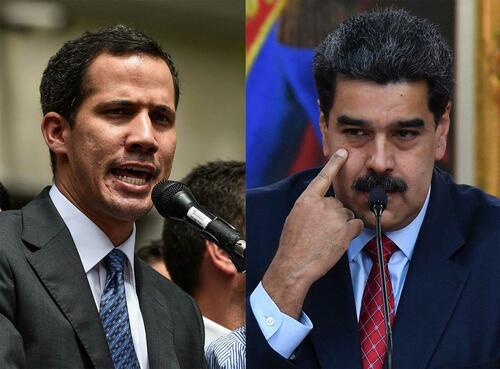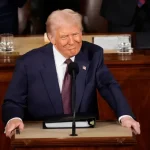
2023 now effectively marks the end of the whole "Interim President Juan Guaidó" fiction of the previous years, after Venezuela's opposition on Friday voted to remove him from this role.
Starting in 2019, Guaidó declared himself as interim president of Venezuela while seeking to invalidate President Nicolas Maduro's controversial 2018 re-election. He had received the full backing of the United States, followed by other countries who can be counted on to mimic Washington policy.

For the latter part of the Trump administration it was official US policy to recognize Guaidó with the "interim president" title, even with Maduro's diplomatic officials at the embassy in Washington being considered persona non grata.
During the Trump years there were even widespread reports of a US-sponsored coup attempt against Maduro, as Guaidó waited in the wings to take over, but which failed and with subsequent efforts to stoke anti-Maduro unrest gaining no traction and ultimately waning.
This was despite Guaidó and his opposition officials not having any real level of power inside Caracas or the country, despite a period of what might be called super star status outside the country and some decree of international or Western recognition.
But since November of 2022, the opposition has been in deepening talks with the Maduro government, coinciding with Maduro officials seeking rapprochement with Washington.
Those unprecedented talks led to the White House unveiling a monumental shift in its Venezuela policy, namely the easing of oil sanctions which allowed Chevron to pump Venezuelan crude and export it to the United States.
The US-led attempt to simply pretend that Juan Guaidó was the actual President of Venezuela - even though not a single person had ever voted for him for that position - was one of the more laughable and pathetic failures of the bipartisan US National Security State. https://t.co/sldO1Pfpwi
— Glenn Greenwald (@ggreenwald) January 1, 2023
Chevron was forced to halt all drilling there just under three years ago due to Trump administration sanctions, also amid the aforementioned US policy that recognized only the opposition leader Guaidó. "Chevron received a six-month license that authorizes the company to produce petroleum or petroleum products in Venezuela," a White House statement indicated.
Chevron as the last major US oil company to operate in Venezuela had before the oil embargo invested in Venezuela's oil fields and machinery over the last century to the tune of an estimated $2.6 billion. But it's expected to take much more than just six months, possibly even years, for Chevron to get its necessary oil field infrastructure, machinery, and logistics chain up and running again to get back to its earlier Venezuela production levels.
2023 now effectively marks the end of the whole “Interim President Juan Guaidó” fiction of the previous years, after Venezuela’s opposition on Friday voted to remove him from this role.
Starting in 2019, Guaidó declared himself as interim president of Venezuela while seeking to invalidate President Nicolas Maduro’s controversial 2018 re-election. He had received the full backing of the United States, followed by other countries who can be counted on to mimic Washington policy.

For the latter part of the Trump administration it was official US policy to recognize Guaidó with the “interim president” title, even with Maduro’s diplomatic officials at the embassy in Washington being considered persona non grata.
During the Trump years there were even widespread reports of a US-sponsored coup attempt against Maduro, as Guaidó waited in the wings to take over, but which failed and with subsequent efforts to stoke anti-Maduro unrest gaining no traction and ultimately waning.
This was despite Guaidó and his opposition officials not having any real level of power inside Caracas or the country, despite a period of what might be called super star status outside the country and some decree of international or Western recognition.
But since November of 2022, the opposition has been in deepening talks with the Maduro government, coinciding with Maduro officials seeking rapprochement with Washington.
Those unprecedented talks led to the White House unveiling a monumental shift in its Venezuela policy, namely the easing of oil sanctions which allowed Chevron to pump Venezuelan crude and export it to the United States.
The US-led attempt to simply pretend that Juan Guaidó was the actual President of Venezuela – even though not a single person had ever voted for him for that position – was one of the more laughable and pathetic failures of the bipartisan US National Security State. https://t.co/sldO1Pfpwi
— Glenn Greenwald (@ggreenwald) January 1, 2023
Chevron was forced to halt all drilling there just under three years ago due to Trump administration sanctions, also amid the aforementioned US policy that recognized only the opposition leader Guaidó. “Chevron received a six-month license that authorizes the company to produce petroleum or petroleum products in Venezuela,” a White House statement indicated.
Chevron as the last major US oil company to operate in Venezuela had before the oil embargo invested in Venezuela’s oil fields and machinery over the last century to the tune of an estimated $2.6 billion. But it’s expected to take much more than just six months, possibly even years, for Chevron to get its necessary oil field infrastructure, machinery, and logistics chain up and running again to get back to its earlier Venezuela production levels.
Loading…







